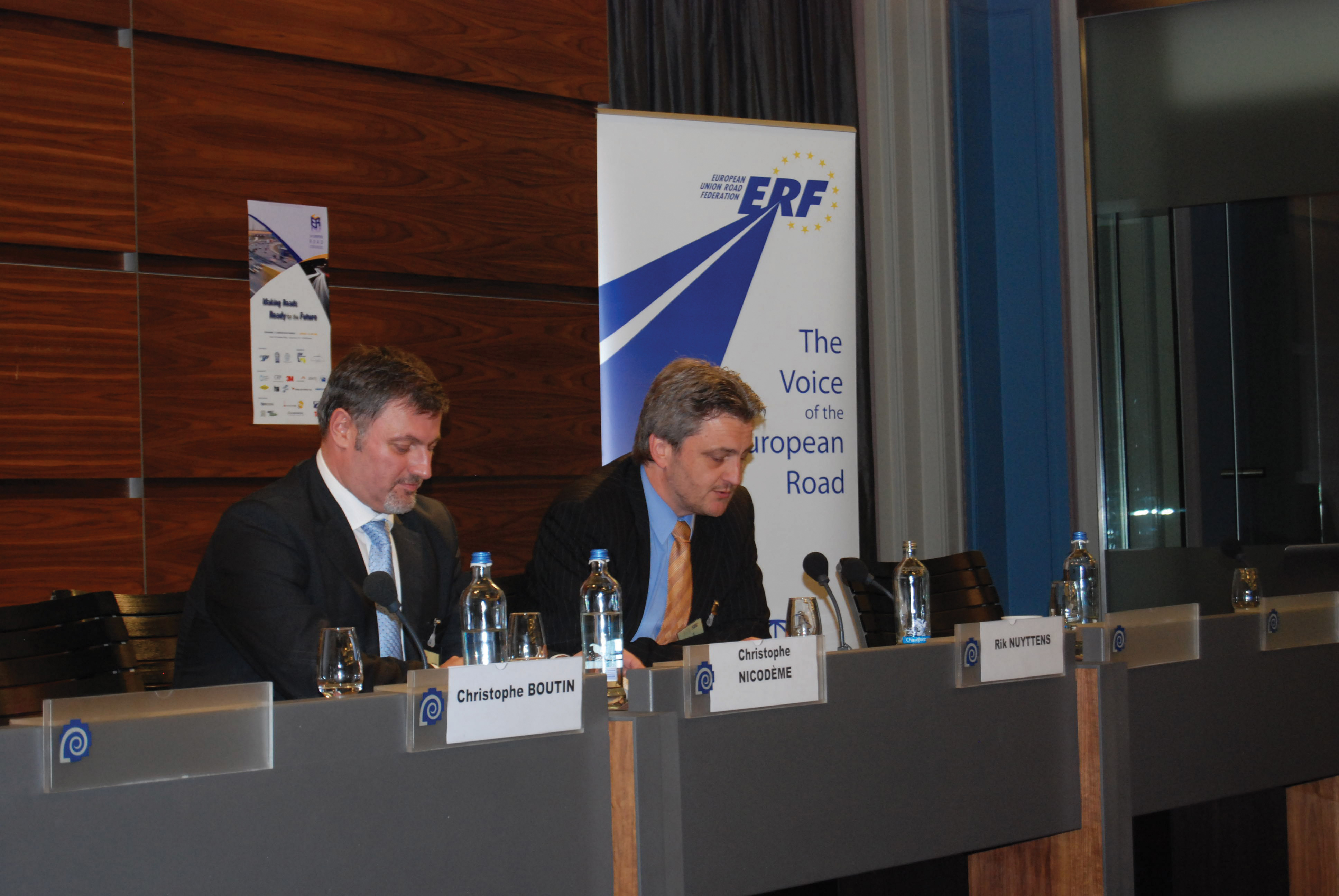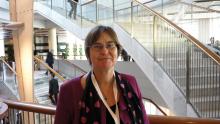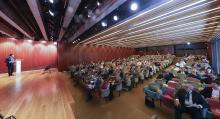Speakers at the 3rd European Road Congress looked at ways of preparing infrastructure to cater for future demands. Patrick Smith reports Road accidents in Europe can be reduced substantially, but vehicles will have to make more use of technology, and they will cost more. The problems will not be made any easier with the knowledge that road transport is set to double between 2040 and 2050. These were just some of the forecasts made at the 3rd European Road Congress, held in Brussels, Belgium, a key road sect

Christophe Nicodème, ERF-IRF BPC Director General, and Rik Nuyttens, the organisation's vice president, sum up at the end of the congress
Speakers at the 3rd European Road Congress looked at ways of preparing infrastructure to cater for future demands. Patrick Smith reports
Road accidents in Europe can be reduced substantially, but vehicles will have to make more use of technology, and they will cost more. The problems will not be made any easier with the knowledge that road transport is set to double between 2040 and 2050.These were just some of the forecasts made at the 3rd European Road Congress, held in Brussels, Belgium, a key road sector event, which attracted more than 100 participants. It saw the interventions of many stakeholders as well as a number of eminent keynote speakers, and was organised by the
Delegates reaffirmed that only placing road infrastructure at the top of the agenda would result in the sector matching the tough expectations placed on it by society.
In the future, roads will have to be more resistant, more 'intelligent', cheaper to build and to maintain and ever safer for their users, as "has always stressed throughout the years by ERF-IRF BPC." The congress heard that it is only an efficient and reliable road transport infrastructure that will allow citizens throughout Europe to become truly "mobile", something which will lead to cascading socio-economic benefits for society as a whole.
Christophe Nicodème, ERF-IRF BPC director general, said the congress had been a big success.
"This conference was rich in content and promising for the road sector," he said, detailing how a shared and common approach would become necessary in order to tackle the future challenges of the road transport sector.
The congress, which was divided in four thematic sessions dealing with the topics of road safety, intelligent transport systems/smarter roads, greener roads and fairer roads, brought together the top decision-makers in the sector to debate the hottest issues and offer ideas over the role of the road infrastructure sector in the years to come.
Dirk van Vreckem, advisor Directorate-General for Transport and Energy (Dg TREN), said that halving the number of road crash victims by 2010 is a political and global commitment and is part of the road safety policy in the European Union, being a shared responsibility among numerous stakeholders. An integrated approach involves user behaviour, vehicle safety and road infrastructure safety. He said that the 50% targets are achievable.
"It is not just a dream. It is possible and we have seen it in some states. Luxembourg achieved it," he said.
Flanders in Action
Opening the congress, Kris Peeters, Flemish Minister-President said that it is the ambition of Flanders [in the northern part of Belgium] to rank among the European top five regions by 2020. An ambitious Flemish government plan, Flanders in Action, being used as a blueprint to give the region a vigorous socio-economic incentive.
In his presentation, he said the region of Flanders had been an undisputed top region for logistics for several years, but this was no reason to feel reassured: competition from other regions in neighbouring countries is huge.
Projects, actions and initiatives have been set in motion to optimise the opening hours of seaport terminals; examine city distribution, and raise awareness of the importance of the logistics sector to Flemish prosperity.
The Minister-President also said the Flanders in Action plan wants to make the region grow in a sustainable way, and this manifested itself in terms of security, respect for the environment and a high quality and healthy living environment thanks to innovative intelligent transport systems He said that since the White Paper of the
The Flemish government has taken steps to meet the target by implementing measures such as increased police supervision, installation of unmanned cameras, customization of traffic fines and extensive sensitivity and communication campaigns. The initiatives have been successful. The number of fatalities has decreased from 1,100 in 1990 to 540 in 2006, with a plan to decrease the number of road fatalities to 250 a year by 2015.
Sustainable transport
Jack Short, secretary of the International Road Forum, which enjoys a privileged position with a wide network of important transport stakeholders, said that transport is 95% dependent on oil, accounts for 60% of all oil consumption and is responsible for 30% of CO2 emissions from fossil fuel combustion in OECD (
"Our projections suggest that even stabilising global transport emissions at the 2050 horizon require a major conceptual shift in technologies and policy. At the same time, traffic growth patterns necessarily reflect the many functions transport plays in our societies today," he said.
"In other words, we need to consider ways of decoupling traffic growth and energy demand while at the same time not losing sight of other transport policy objectives such as traffic safety and congestion. This is the key political message that emerged at the recent meeting of the International Transport Forum in Leipzig (Germany). The path to achieving this ambitious goal is neither known nor agreed. It needs to be recognised that countries are at very different stages in the development of their economies and transport systems and most of them have, and will, continue to face a difficult task of meeting transport demand induced by economic activity and people's lives and reducing Greenhouse Gas emissions." For transport to first limit and then reduce its emissions, a combination of wide ranging policy packages and technological advances is needed. However, dramatic technological breakthroughs are some decades distant and it is essential now to make the improvements that are available, that are effective and that are affordable.
"Cost effective advances in vehicle technologies could reduce emissions by 30%, while even more ambitious targets are feasible in the longer term through improvements in battery technologies," he said.
"Naturally, many countries are facing limitations of the 'build only' option because there is little additional space available for new infrastructure, but existing transport assets need to be maintained, upgraded and renewed. This is costly, but benefits future generations.
"Some think that sustainable transport means spending less. The opposite is true. We need to spend, selectively and wisely, to ensure new transport capacity is built and maintained in a sustainable way."








